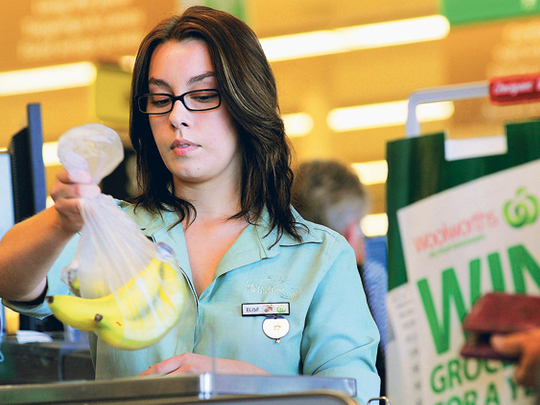
Sydney: Australian retail sales suffered their biggest fall in a year in February as higher interest rates ate into consumers' spending power, a surprisingly weak result that cast doubts on chances of an interest rate hike next week.
The Australian dollar shed half a cent while interbank futures edged up as investors pared chances of a further rate rise from the Reserve Bank of Australia (RBA) at its policy meeting on April 6.
Retail sales fell 1.4 per cent from January on a seasonally adjusted basis, versus forecasts for a 0.2 per cent rise.
Other data showed approvals for new homes also surprised by dropping 3.3 per cent in February, largely due to another big fall in apartment buildings.
Private credit was the only figure to match expectations, rising 0.4 per cent from January.
Area of concern
Also, a private sector index showed a strong jump in house prices in February, backing the RBA's view that the housing sector was shaping up as an area of concern as the economy accelerates.
"On balance, today's data must temper the case for a RBA hike in April," said Scott Haslem, chief economist at UBS. "That doesn't mean they wont hike, as it remains a close call."
Interbank futures are pricing in a 54 per cent chance of a 25-basis point hike to 4.25 per cent next week, down from around 60 per cent before the data was released. The implied probability fell to 66 per cent from 75 per cent beforehand.
The RBA raised the cash rate in March by 25 basis points, having already hiked it by 75 basis points between October and December last year as the economy rapidly recovered from the global downturn.
But it shocked markets by skipping a widely expected increase at its February meeting, citing global risks such as high debt levels in some countries.
Market expectations of another rate hike had been building earlier this week after RBA Governor Glenn Stevens took the highly unusual step of going on television to warn there was a danger in keeping rates too low for too long and openly discouraged Australians from taking on debt to invest in housing.
Adding to the case for a rate rise was news that major Japanese and South Korean steel mills had agreed to a price increase of 90 per cent for iron ore this year. That would be a huge windfall for Australian miners and the economy in general as the country is a big exporter of iron ore.
"We still think the RBA will go [raise rates next week] given the boom unfolding in the resources sector and the background of froth in the housing market," said Kieran Davies, chief economist at the Royal Bank of Scotland.
Regardless of whether it moves next week, the RBA is still expected to raise rates by a total of 122 basis points over the next 12 months to curb inflationary pressures, in sharp contrast to the glacial pace of rises expected in much weaker Western economies.












